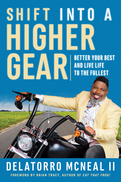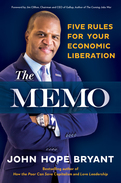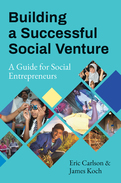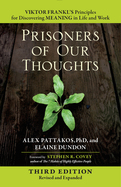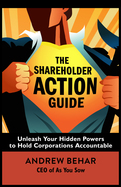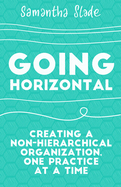Search Results: "servant leadership"
Results 517-522 of 522
Kick fear-based living to the curb and discover exactly how to manifest the life of your dreams!
Is there another level of life that you want to live? Are there goals you've been struggling to achieve? It's time to stop settling for excuses and start achieving excellence!
With nearly two decades of experience working with high achievers globally, peak performance expert Delatorro McNeal II is passionate about teaching people how to live life full throttle. As a motorcycle enthusiast, McNeal uses powerful biking metaphors to vividly illustrate how to reject the monotony of living on cruise control. Packed with interactive exercises, compelling questions, and thought-provoking analogies, this book teaches you the methodology and the psychology to bring the best out of yourself! Each of the twelve chapters starts with the word Shift and invites you to make a simple but profound change that will accelerate your results and expand the horizons of your possibilities. You'll discover how to
• Lean into the curves of life and business
• Sever your dependency on the “kickstands of life”
• Put your weight into the changes you desire most
• Steer the flow of your emotional states
• Shift your core relationships to invite the right posse to your biker club
• Drive defensively to avoid the potholes that stop most people from succeeding
From the introduction all the way through to the conclusion, this book is a transformational seminar on paper. Join Delatorro McNeal as he takes you on the personal development journey of a lifetime.
Is there another level of life that you want to live? Are there goals you've been struggling to achieve? It's time to stop settling for excuses and start achieving excellence!
With nearly two decades of experience working with high achievers globally, peak performance expert Delatorro McNeal II is passionate about teaching people how to live life full throttle. As a motorcycle enthusiast, McNeal uses powerful biking metaphors to vividly illustrate how to reject the monotony of living on cruise control. Packed with interactive exercises, compelling questions, and thought-provoking analogies, this book teaches you the methodology and the psychology to bring the best out of yourself! Each of the twelve chapters starts with the word Shift and invites you to make a simple but profound change that will accelerate your results and expand the horizons of your possibilities. You'll discover how to
• Lean into the curves of life and business
• Sever your dependency on the “kickstands of life”
• Put your weight into the changes you desire most
• Steer the flow of your emotional states
• Shift your core relationships to invite the right posse to your biker club
• Drive defensively to avoid the potholes that stop most people from succeeding
From the introduction all the way through to the conclusion, this book is a transformational seminar on paper. Join Delatorro McNeal as he takes you on the personal development journey of a lifetime.
The Memo
2017
True power in this world comes from economic independence, but too many people have too much month left at the end of their money. John Hope Bryant, founder and CEO of Operation HOPE, illuminates the path toward liberation that is hiding in plain sight. His message is simple: the supermajority of people who live in poverty, whom Bryant calls the invisible class, as well as millions in the struggling middle class, haven't gotten “the memo”—until now.
Building on his personal experience of rising up from economically disadvantaged circumstances and his work with Operation HOPE, Bryant teaches readers five rules that lay the foundation for achieving financial freedom. He emphasizes the inseparable connection between “inner capital” (mindset, relationships, knowledge, and spirit) and “outer capital” (financial wealth and property). “If you have inner capital,” Bryant writes, “you can never be truly poor. If you lack inner capital, all the money in the world cannot set you free.”
Bryant gives readers tools for empowerment by covering everything from achieving basic financial literacy to investing in positive relationships and approaching wealth with a completely new attitude. He makes this bold and controversial claim: “Once you have satisfied your basic sustenance needs—food, water, health, and a roof over your head—poverty has more to do with your head than your wallet.”
Bryant wants to restore readers' “silver rights,” giving them the ability to succeed and prosper no matter what very real roadblocks society puts in their way. We have more power than we realize, if only we can recognize and claim it. “We are our first capital,” Bryant writes. “We are the CEOs of our own lives.”
Building on his personal experience of rising up from economically disadvantaged circumstances and his work with Operation HOPE, Bryant teaches readers five rules that lay the foundation for achieving financial freedom. He emphasizes the inseparable connection between “inner capital” (mindset, relationships, knowledge, and spirit) and “outer capital” (financial wealth and property). “If you have inner capital,” Bryant writes, “you can never be truly poor. If you lack inner capital, all the money in the world cannot set you free.”
Bryant gives readers tools for empowerment by covering everything from achieving basic financial literacy to investing in positive relationships and approaching wealth with a completely new attitude. He makes this bold and controversial claim: “Once you have satisfied your basic sustenance needs—food, water, health, and a roof over your head—poverty has more to do with your head than your wallet.”
Bryant wants to restore readers' “silver rights,” giving them the ability to succeed and prosper no matter what very real roadblocks society puts in their way. We have more power than we realize, if only we can recognize and claim it. “We are our first capital,” Bryant writes. “We are the CEOs of our own lives.”
This is the first book on creating and running a social enterprise to combine theoretical discussions with current cases from around the world, filling a huge gap in the literature. It serves as an eminently practical blueprint for those who wish to build, sustain, and grow social ventures.
Building a Successful Social Venture draws on Eric Carlson's and James Koch's pioneering work with the Global Social Benefit Institute, cofounded by Koch at Santa Clara University's Miller Center for Social Entrepreneurship. Since 2003, over 200 Silicon Valley executives have mentored more than 800 aspiring social entrepreneurs at the GSBI. It is this unparalleled real-world foundation that truly sets the book apart. Early versions of the book were used in both undergraduate and MBA classes.
Part 1 of the book describes the assumptions that the GSBI model is based on: a bottom-up approach to social change, a focus on base-of-the-pyramid markets, and a specific approach to business planning developed by the GSBI. Part 2 presents the seven elements of the GSBI business planning process, and Part 3 lays out the keys to executing it. The book includes “Social Venture Snapshots” illustrating how different organizations have realized elements of the plan, as well as a wealth of checklists and exercises.
Social ventures hold enormous promise to solve some of the world's most intractable problems. This book offers a tested framework for students, social entrepreneurs, and field researchers who wish to learn more about the application of business principles and theories of change for advancing social progress and creating a more just world.
Building a Successful Social Venture draws on Eric Carlson's and James Koch's pioneering work with the Global Social Benefit Institute, cofounded by Koch at Santa Clara University's Miller Center for Social Entrepreneurship. Since 2003, over 200 Silicon Valley executives have mentored more than 800 aspiring social entrepreneurs at the GSBI. It is this unparalleled real-world foundation that truly sets the book apart. Early versions of the book were used in both undergraduate and MBA classes.
Part 1 of the book describes the assumptions that the GSBI model is based on: a bottom-up approach to social change, a focus on base-of-the-pyramid markets, and a specific approach to business planning developed by the GSBI. Part 2 presents the seven elements of the GSBI business planning process, and Part 3 lays out the keys to executing it. The book includes “Social Venture Snapshots” illustrating how different organizations have realized elements of the plan, as well as a wealth of checklists and exercises.
Social ventures hold enormous promise to solve some of the world's most intractable problems. This book offers a tested framework for students, social entrepreneurs, and field researchers who wish to learn more about the application of business principles and theories of change for advancing social progress and creating a more just world.
7 Principles for Finding Meaning in Life & Work
World-renowned psychiatrist Viktor Frankl's Man's Search for Meaning is one of the most important books of modern times. Frankl's extraordinary personal story of finding meaning amid the horrors of the Nazi concentration camps has inspired millions. Frankl vividly showed that you always have the ultimate freedom to choose your attitude—you don't have to be a prisoner of your thoughts.
Dr. Alex Pattakos—who was urged by Frankl to write Prisoners of Our Thoughts—and Elaine Dundon, a personal and organizational innovation thought leader, show how Frankl's wisdom can help readers find meaning in every moment of their lives. Drawing on the entire body of Frankl's work, they identify seven “core principles” and demonstrate how they can be applied to everyday life and work.
This revised and expanded third edition features new stories, practical exercises, applications, and insights from the authors' new work in MEANINGology®. Three new chapters outline how we all can benefit by putting meaning at the core of our lives, work, and society. And a new chapter on Viktor Frankl's legacy illustrates how his work continues to influence so many around the world.
World-renowned psychiatrist Viktor Frankl's Man's Search for Meaning is one of the most important books of modern times. Frankl's extraordinary personal story of finding meaning amid the horrors of the Nazi concentration camps has inspired millions. Frankl vividly showed that you always have the ultimate freedom to choose your attitude—you don't have to be a prisoner of your thoughts.
Dr. Alex Pattakos—who was urged by Frankl to write Prisoners of Our Thoughts—and Elaine Dundon, a personal and organizational innovation thought leader, show how Frankl's wisdom can help readers find meaning in every moment of their lives. Drawing on the entire body of Frankl's work, they identify seven “core principles” and demonstrate how they can be applied to everyday life and work.
This revised and expanded third edition features new stories, practical exercises, applications, and insights from the authors' new work in MEANINGology®. Three new chapters outline how we all can benefit by putting meaning at the core of our lives, work, and society. And a new chapter on Viktor Frankl's legacy illustrates how his work continues to influence so many around the world.
“A valuable call to action for small shareholders to change the ways big corporations do business.”
—Robert Reich, former US Secretary of Labor
Want to make misbehaving corporations mend their ways? You can! If you own their stock, corporations have to listen to you. Shareholder advocate Andrew Behar explains how to exercise your proxy voting rights to weigh in on corporate policies—you only need a single share of stock to do it. If you've got just $2,000 in stock, Behar shows how you can go further and file a resolution to directly address the board of directors. And even if your investments are in a workplace-sponsored 401(k) or a mutual fund, you can work with your fund manager to purge corporations from your portfolio that don't align with your values. Illustrated with inspiring stories of individuals who have gone up against corporate Goliaths and won, this book informs, inspires, and instructs investors how to unleash their power to change the world.
—Robert Reich, former US Secretary of Labor
Want to make misbehaving corporations mend their ways? You can! If you own their stock, corporations have to listen to you. Shareholder advocate Andrew Behar explains how to exercise your proxy voting rights to weigh in on corporate policies—you only need a single share of stock to do it. If you've got just $2,000 in stock, Behar shows how you can go further and file a resolution to directly address the board of directors. And even if your investments are in a workplace-sponsored 401(k) or a mutual fund, you can work with your fund manager to purge corporations from your portfolio that don't align with your values. Illustrated with inspiring stories of individuals who have gone up against corporate Goliaths and won, this book informs, inspires, and instructs investors how to unleash their power to change the world.
Going Horizontal
2018
Hierarchy in organizations is obsolete. There is a better way: one that increases the engagement of employees and managers alike, reduces micromanaging and other limiting approaches, and promotes organizational and individual success.
In this book, self-management expert Samantha Slade presents seven concrete practices to help your organization flatten its existing hierarchy and develop a horizontal organization. The result will be enhanced creativity, greater growth, and a increased employee retention and productivity—and a better bottom line.
These days, more than ever, successful organizations must respond quickly and nimbly to change—they need every employee's best thinking. A horizontal organization creates an environment of true collaboration, respect, and openness. It allows everyone more freedom to express unconventional ideas or to work through issues that are getting in the way of organizational goals. And it's a more human way to organize—after all, we function perfectly well in our day-to day lives without someone telling us what to do.
But when an organization decides to go horizontal, it can be overwhelming for both managers and employees. Slade offers a practical, proven, incremental method to help organizations of all kinds and sizes ease in to a non-hierarchical model. She includes techniques for using your organization's purpose to stay focused and aligned, developing shared decision-making, creating a mutual feedback culture, nurturing autonomy, holding co-managed meetings, and maintaining an environment of collective learning.
Going Horizontal will help organizations become more adaptive, collaborative and innovative, which is vital in today's highly competitive and constantly-evolving world.
In this book, self-management expert Samantha Slade presents seven concrete practices to help your organization flatten its existing hierarchy and develop a horizontal organization. The result will be enhanced creativity, greater growth, and a increased employee retention and productivity—and a better bottom line.
These days, more than ever, successful organizations must respond quickly and nimbly to change—they need every employee's best thinking. A horizontal organization creates an environment of true collaboration, respect, and openness. It allows everyone more freedom to express unconventional ideas or to work through issues that are getting in the way of organizational goals. And it's a more human way to organize—after all, we function perfectly well in our day-to day lives without someone telling us what to do.
But when an organization decides to go horizontal, it can be overwhelming for both managers and employees. Slade offers a practical, proven, incremental method to help organizations of all kinds and sizes ease in to a non-hierarchical model. She includes techniques for using your organization's purpose to stay focused and aligned, developing shared decision-making, creating a mutual feedback culture, nurturing autonomy, holding co-managed meetings, and maintaining an environment of collective learning.
Going Horizontal will help organizations become more adaptive, collaborative and innovative, which is vital in today's highly competitive and constantly-evolving world.


